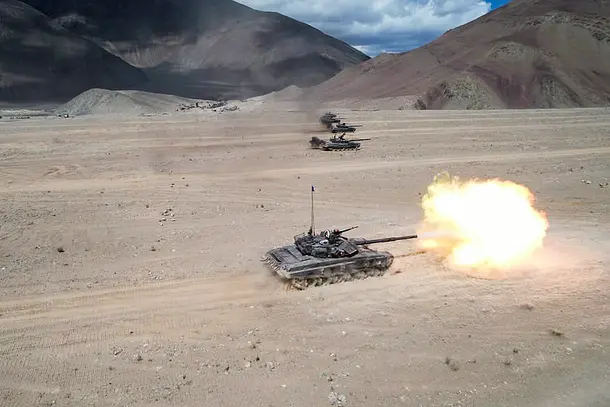This time, the Indian Army carried out a brand-new drill in the Ladakh zone that has been dubbed Blitzkrieg, an aggressive tactic. The Second World War Nazi German Wehrmacht is thought to have introduced the practise.
Lt Gen Upendra Dwivedi, the GOC-in-C Northern Command, spent five days last week in Ladakh where, among other things, he assessed the success of Exercise Blitzkrieg.
The Nazi German Army used a combination of tanks, motorised infantry, foot troops, artillery, and air power to attack the adversary’s defences on a narrow front, piercing deep into enemy territory, and leaving the rear and flanks to be covered by the elements lagging the strike groups.
The combined arms Corps Level exercise was held as a follow-up to the standoff with the Chinese PLA in eastern Ladakh and was intended to evaluate a number of operational ideas.
While practically all armies have learned vital lessons from how the Germans conducted their operations during the Second World War, it is presumed that when the Northern Command titled the exercise after the German tactics, it had a similar idea of speed and manoeuvrability in mind.
When referring to a military operation in Ladakh, using the phrase “blitzkrieg” could convey a false impression. Additionally, it might give the Chinese the wrong impression given the tense situation right now and suggest that some Blitzkrieg tactics could be forthcoming in the region.
Any alternative name like “Firm Resolve” or anything like would have been more neutral and less prone to misunderstanding given the inclination of the Chinese to micro-analyze statements, particularly military ones.
Blitzkrieg is described by The Imperial War Museum (IWM) as “the method of offensive warfare responsible for Nazi Germany’s military achievements in the early years of the Second World War.” It entails making a strong attack deep within enemy territory to seize targets.
On the night of June 15 and 16, two years had passed since fierce fighting between Indian and Chinese soldiers broke out in the Galwan valley, yet tensions still exist and negotiations are ongoing.
